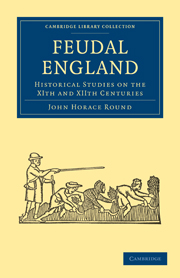Book contents
- Frontmatter
- Preface
- Contents
- PART I TERRITORIAL STUDIES
- PART II HISTORICAL STUDIES
- NORMANS UNDER EDWARD THE CONFESSOR
- MR. FREEMAN AND THE BATTLE OF HASTINGS
- MASTER WACE
- NOTE ON THE PSEUDO-INGULF
- REGENBALD, PRIEST AND CHANCELLOR
- THE CONQUEROR AT EXETER
- THE ALLEGED DESTRUCTION OF LEICESTER (1068)
- ELY AND HER DESPOILERS (1072–75)
- THE LORDS OF ARDRES
- EARLY IRISH TRADE WITH CHESTER AND ROUEN
- WALTER TIREL AND HIS WIFE
- WALDRIC, WARRIOR AND CHANCELLOR
- A CHARTER OF HENRY I. (1123)
- THE ORIGIN OF THE NEVILLES
- THE ALLEGED INVASION OF ENGLAND IN 1147
- THE ALLEGED DEBATE ON DANEGELD (1163)
- A GLIMPSE OF THE YOUNG KING'S COURT (1170)
- THE FIRST KNOWN FINE (1175)
- THE MONTMORENCY IMPOSTURE
- THE OXFORD DEBATE ON FOREIGN SERVICE (1197)
- RICHARD THE FIRSTS CHANGE OF SEAL (1198)
- COMMUNAL HOUSE DEMOLITION
- THE CINQUE PORT CHARTERS
- ADDENDA
- INDEX
THE ALLEGED DEBATE ON DANEGELD (1163)
Published online by Cambridge University Press: 05 October 2010
- Frontmatter
- Preface
- Contents
- PART I TERRITORIAL STUDIES
- PART II HISTORICAL STUDIES
- NORMANS UNDER EDWARD THE CONFESSOR
- MR. FREEMAN AND THE BATTLE OF HASTINGS
- MASTER WACE
- NOTE ON THE PSEUDO-INGULF
- REGENBALD, PRIEST AND CHANCELLOR
- THE CONQUEROR AT EXETER
- THE ALLEGED DESTRUCTION OF LEICESTER (1068)
- ELY AND HER DESPOILERS (1072–75)
- THE LORDS OF ARDRES
- EARLY IRISH TRADE WITH CHESTER AND ROUEN
- WALTER TIREL AND HIS WIFE
- WALDRIC, WARRIOR AND CHANCELLOR
- A CHARTER OF HENRY I. (1123)
- THE ORIGIN OF THE NEVILLES
- THE ALLEGED INVASION OF ENGLAND IN 1147
- THE ALLEGED DEBATE ON DANEGELD (1163)
- A GLIMPSE OF THE YOUNG KING'S COURT (1170)
- THE FIRST KNOWN FINE (1175)
- THE MONTMORENCY IMPOSTURE
- THE OXFORD DEBATE ON FOREIGN SERVICE (1197)
- RICHARD THE FIRSTS CHANGE OF SEAL (1198)
- COMMUNAL HOUSE DEMOLITION
- THE CINQUE PORT CHARTERS
- ADDENDA
- INDEX
Summary
THE great importance attached by historians to the financial dispute at the council of Woodstock in 1163 renders it desirable that the point at issue should be clearlystated and understood. As I venture to believe that the accepted view on the matter in dispute is erroneous, I here submit the reasons which have led me to that conclusion. “Two most important points,” writes Dr. Stubbs, “stand out” on this occasion: (1) “this is the first case of any express opposition being made to the king's financial dealings since the Conquest”; (2) “the first fruit of the first constitutional opposition is the abolition of the most ancient property-tax [danegeld] imposed as a bribe for the Danes.”1 It is with the second of these points that I propose specially to deal.
The passage which forms our best evidence is found in Grim's Life of St. Thomas, and its relative portion is as follows:–
Movetur quaestio de consuetudine quadam quae in Anglia tenebatur. Dabantur de hida bini solidi ministris regis qui vicecomitum loco comitatus servabant, quos voluit rex conscribere fisco et reditibus propriis associare. Cui archiepiscopus in faciem restitit, dicens, non debere eos exigi pro reditibus, “nee pro reditu,” inquit,“dabimus eos, domine rex, salvo beneplacito vestro: sed si digne nobis servierint vicecomites, et servientes vel ministri provinciarum, et homines nostros manutenuerint, nequaquam eis deerimus in auxilium.” Rex autem aegre ferens archiepiscopi responsionem, “Per oculos Dei,” ait, “dabuntur pro reditu, et in scriptura regis scribentur.”
- Type
- Chapter
- Information
- Feudal EnglandHistorical Studies on the XIth and XIIth Centuries, pp. 497 - 502Publisher: Cambridge University PressPrint publication year: 2010First published in: 1895

